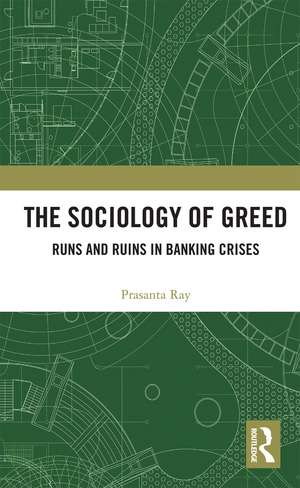The Sociology of Greed: Runs and Ruins in Banking Crises
Autor Prasanta Rayen Limba Engleză Paperback – 18 dec 2020
Breaking new ground, the book looks at the moral economy of capitalism and money culture by focusing on the victims of banking crises, hitherto unexplored in Western empirical research. Through sociological analyses of political economy, it seamlessly combines archival records, survey and statistical data with literary narratives, realist fiction and performing arts to recount how the greed of bank owners and managers ruined their institutions as well as common people. It argues that greed turns perilous when the state and the market facilitate its agency, and it examines the contexts and histories, the indifference of the fledgling colonial state, feeble political response, and the consequences for those who were impacted and the losses, especially the refugees, the lower-middle class and women. The volume also re-composes relevant elements of Western sociological scholarship from classical theories to early twenty-first-century financial sociology.
An insightful account of the social history of banking in India, this book will greatly interest researchers and scholars in sociology, economics, history and cultural studies.
| Toate formatele și edițiile | Preț | Express |
|---|---|---|
| Paperback (1) | 382.18 lei 6-8 săpt. | |
| Taylor & Francis – 18 dec 2020 | 382.18 lei 6-8 săpt. | |
| Hardback (1) | 1000.27 lei 6-8 săpt. | |
| Taylor & Francis – 3 apr 2018 | 1000.27 lei 6-8 săpt. |
Preț: 382.18 lei
Nou
Puncte Express: 573
Preț estimativ în valută:
73.15€ • 76.08$ • 61.30£
73.15€ • 76.08$ • 61.30£
Carte tipărită la comandă
Livrare economică 14-28 martie
Preluare comenzi: 021 569.72.76
Specificații
ISBN-13: 9780367734947
ISBN-10: 036773494X
Pagini: 216
Dimensiuni: 138 x 216 x 15 mm
Greutate: 0.28 kg
Ediția:1
Editura: Taylor & Francis
Colecția Routledge India
Locul publicării:Oxford, United Kingdom
ISBN-10: 036773494X
Pagini: 216
Dimensiuni: 138 x 216 x 15 mm
Greutate: 0.28 kg
Ediția:1
Editura: Taylor & Francis
Colecția Routledge India
Locul publicării:Oxford, United Kingdom
Public țintă
PostgraduateCuprins
List of Tables. Acknowledgements. A Convolute. Introduction 1. The Institutional Crisis 2. Retrieving Trust: The Banks, the State and the Press 3. The Victims 4. The Losers’ Responses 5. Grasping Greed. Epilogue. Appendix 1 Banks in Calcutta, 1947. Appendix 2 Bank in Liquidation. Appendix 3 Archival Records. Index
Notă biografică
Prasanta Ray is Professor Emeritus in Sociology, Presidency University, Kolkata, and Honorary Visiting Professor, Institute of Development Studies, Kolkata, India. He was Professor and Head, Department of Political Science, Presidency College; Professor-in-Charge, Department of Sociology, Presidency College; Guest Faculty member, Department of Sociology, Calcutta University; Member, Calcutta Research Group; and Member, Working Group on Under-Graduate Colleges in India, National Knowledge Commission, 2006. His books include Conflict and the State: An Exploration in the Behaviour of the Post-Colonial State in India (1991) and Pratyaha: Everyday Lifeworlds: Dilemmas, Contestations and Negotiations (co-edited with Nandini Ghosh, 2016).
Recenzii
‘[This book] illuminates not only our social and economic history but also the moral economy of underdeveloped capitalism . . . reminds one of Adam Smith and Marx on early capitalism.’
Sabyasachi Bhattacharya, former Professor of History at Jawaharlal Nehru University, former Chairman of the Indian Council of Historical Research, and former Vice-Chancellor, Visva-Bharati University, India
Sabyasachi Bhattacharya, former Professor of History at Jawaharlal Nehru University, former Chairman of the Indian Council of Historical Research, and former Vice-Chancellor, Visva-Bharati University, India
Descriere
This book examines crises in financial institutions such as banks from the vantage point of greed of the people at their helm. It offers an intensive analysis of the banking crises under conditions of colonial capitalism in early-twentieth century Bengal that led to institutional and social collapse. Breaking new ground, the work looks at the mo
